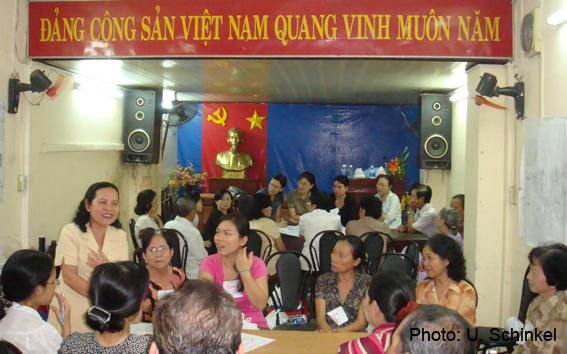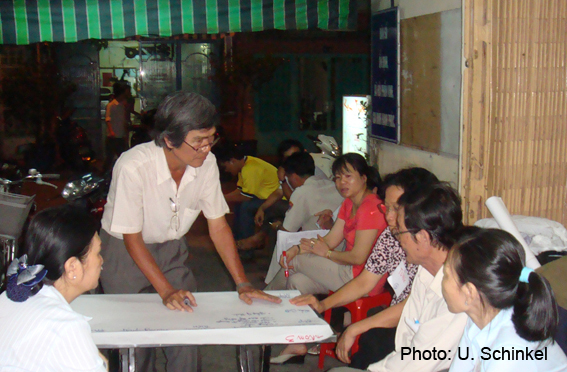Community Action Planning
CBA Model Project
In order to test the applicability of CBA, a model project was planned and implemented in HCMC. The area chosen for the model project is located in District 4, Ward 8, Sub-Ward 2, an area that is frequently affected by flooding and thermal stress. The model project was planned and implemented in collaboration with the international NGO ENDA Vietnam, the local community and their local authority at ward level. The model project was initially envisaged for the period between February and December 2010; however, the workshops were continued up to May 2011 in order to ensure the continuation and sustainability of the model project.
The model project was set up in order to reduce the model community’s vulnerability to flooding and thermal stress and to create a show-case to promote the CBA as a feasible local level approach to respond to climate change. Moreover, new alliances between different stakeholder groups were established to initiate joint action and to take the approach beyond the project level.
The CBA model project followed the action planning approach and was therefore based on a set of consecutive workshops that one after another focused on participatory assessments of local climate change impacts, action planning activities that were followed by an implementation phase as well as on monitoring, evaluation and dissemination. The workshops were moderated and facilitated by ENDA Vietnam and the local ward authority; input sessions on climate change, adaptation and mitigation were integrated for awareness raising and in preparation for the action planning activities.
As a result of the model project, the community grew pot plants in private and public open spaces to reduce thermal stress, re-arranged interiors to allow for more natural ventilation inside buildings and started waste management activities to avoid the blocking of drainages and to reduce flooding levels during high tide and heavy rain events. Moreover, the community started to reduce unnecessary energy consumption as a mitigation measure. Until today, the community members implement those adaptation and mitigation measures; elderly community members have formed a committee that oversees the activities and engages in awareness raising among neighbours.
Dissemination
In order to promote CBA and to initiate replication projects all over the country, a field manual was developed that traces the CBA model project on the one hand and that provides a step-by-step guideline for replication projects. The manual was circulated among Vietnamese and international civil society organizations as well as among local and national government agencies and planning departments. The field manual is an open educational resource and available from this website in English and Vietnamese.
Outlook
CBA Project in Đà Nẵng
In 2013, the BTU Cottbus-Senftenberg started to partner with the German Agency for International Cooperation (GIZ) and with GIZ’s ‘Environmentally and Climate-friendly Urban Development in Đà Nẵng (ECUD)’ project. Based on the experiences made in HCMC, a CBA project with a main focus on storm resilience was set up for Đà Nẵng and integrated into the ECUD project. While the CBA project is implemented under the leadership of GIZ, researchers of BTU Cottbus-Senftenberg act as advisors.
The methodology designed for HCMC was adapted to the local conditions in Đà Nẵng; barriers for replication, out-scaling and up-scaling were dismantled by integrating all relevant stakeholders from the beginning, namely - besides the local community - the People’s Committee at city, district and ward level, the Association of Cities of Vietnam (ACVN), all relevant planning departments and mass organizations.
Multi-Stakeholder Dialogues
In cooperation with WP9, two Roundtables
‘Just Bottom-Up is not Enough! How to Implement Comprehensive Climate Adaptation and Energy Efficiency Solutions on the Local Level?’
and
‘Just Bottom-Up is not Enough! Part II Roundtable to Develop Recommendations for Enabling Comprehensive Climate Change Adaptation & Energy-Efficiency Solutions at the Local Level’
were held in HCMC in December 2012 and July 2013 with participation of representatives of academia, civil society, the donor community, local government and the corporate sector. The Roundtables aimed at building new and unusual stakeholder alliances to foster bottom-up development and to formulate agreed recommendations to enable local level solutions for climate change adaptation and energy-efficiency in the Vietnamese context.


